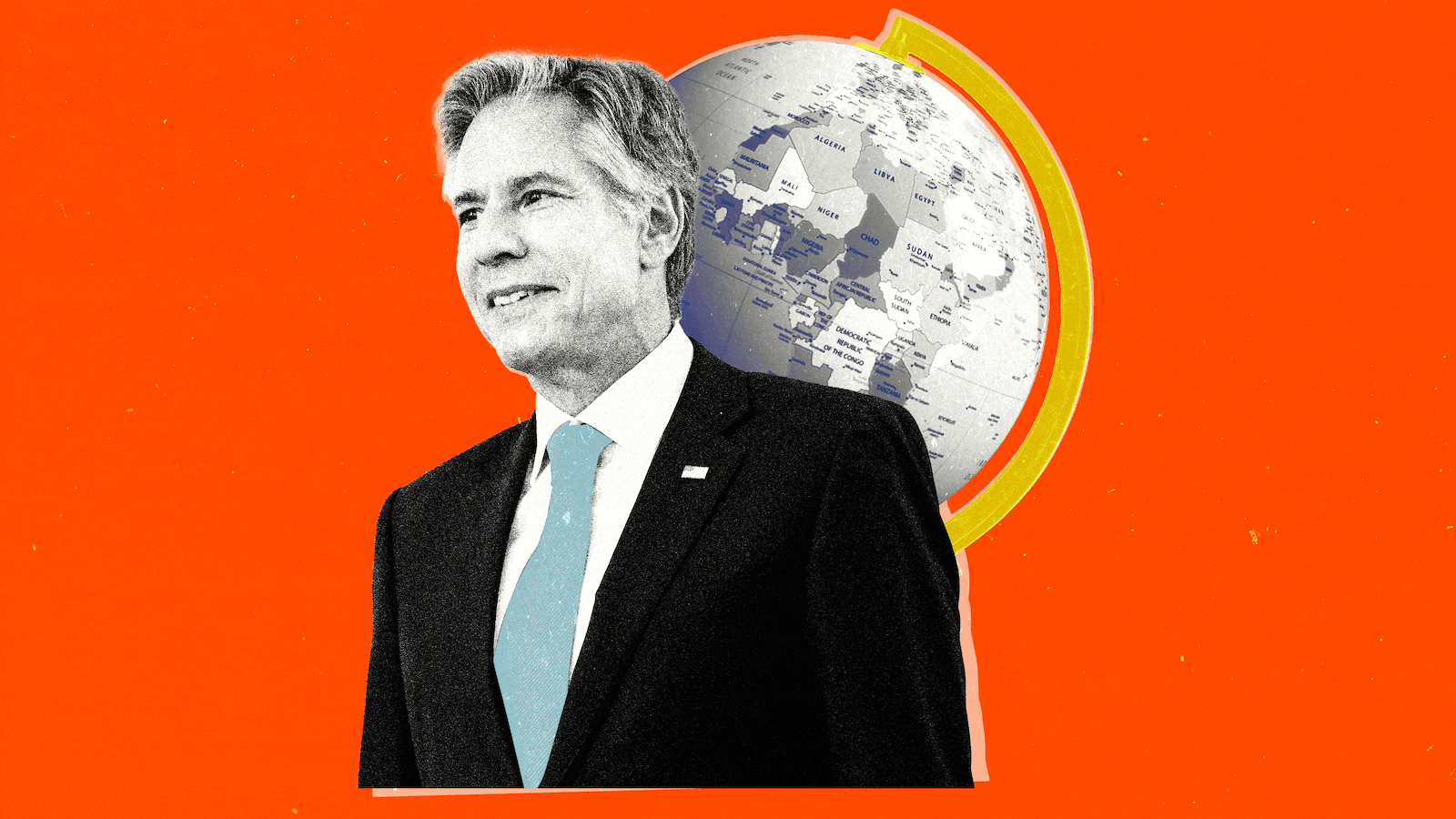What if the media appetite for flash, big personalities, and buzzy stories had exactly nothing to do with governing?
It is not a new phenomenon. The media values “great communicators” because they are in the communications business. They zero in on characters who are quotable, controversial, that trigger emotions and therefore drive audiences.
When it comes to presidents, that is the road that led directly from Reagan to Trump, even though it was presidents who may have been drier—from Eisenhower to Biden—may have gotten more done.
The same is true in the foreign policy world. Henry Kissinger dated starlets but worked even harder at seducing the press with wit and well-turned quotes, whereas less charismatic secretaries of state may have had an equivalent or greater positive impact. George Marshall comes to mind. So does James Baker. And so too, I suspect, should Antony Blinken.
Secretary of State Blinken delivered remarks at the Johns Hopkins School of Advanced International Studies on Wednesday that asserted America had embarked on an entirely new era in foreign policy during the Biden years. He argued that the current period is “now is more than a test of the Post-Cold War order. It is the end of it.” He described it as “a hinge moment in history” or, citing the president, “an inflection point” when “one era is ending and a new one is beginning.”
Then, he laid out how the U.S. is strengthening its alliances and its relations—even with nations with which we have substantial differences—in order to remain strong in the face of competition from China and Russia and looming technological and economic challenges.
It is not unusual for secretaries of state to give such speeches. All seek to frame the work of the administrations in which they serve as consequential. Most suffer from “doctrine envy,” the deep desire of foreign policy policymakers and presidents to define a moment in history with their ideas and even their names.
But when it comes to concrete actions, or to actually successfully addressing the difficult moments faced by all administrations most come up short—or worse, they oversee the kind of disastrous mistakes that have marked so much of U.S. foreign policy history, from Vietnam to Iraq, from the secret war in Cambodia to Trump’s decisions to pull out of the Iran nuclear deal or to canoodle with Vladimir Putin.
But here is where Blinken’s speech and Biden administration foreign policy have been different. They have actually walked the walk. They have actually done the difficult, often invisible work of remaking not just our foreign policy but our role in the world, our alliances, our priorities, even the ways in which we link our foreign policy to our domestic concerns—or to our investments in and approaches to critical technologies, from the manufacture of chips to AI.

Antony Blinken speaks at the Johns Hopkins School of Advanced International Studies Brzezinski Lecture Series in Washington on September 13, 2023.
Kevin Lamarque/ReutersHad Blinken’s speech come at a different time, perhaps it would not have as effectively resonated as a statement of what has been done and is being worked on. It might have seemed as abstract and disposable as the largely rhetorical exercises of so many of his recent predecessors.
But it comes just as President Biden has returned from an ambitious, active, and successful round-the-world trip and Vice President Kamala Harris has returned from playing a central role in the ASEAN Summit in Indonesia. It comes as U.S. and allied support in Ukraine is producing meaningful progress in that war, and as historic Biden administration investments in green energy seem more critical in the face of a deepening climate crisis.
The speech therefore was as notable for the concrete accomplishments it enumerated as it was for the intellectual framework for this new era in U.S. foreign policy that it described.
That is not to say the framing ideas at the heart of Blinken’s remarks were not important. They should be noted by Americans and by allies and rivals worldwide.
In a nutshell, what he sought to communicate is that we believe we have a unique role to play as global leaders, and we have the will to pursue that role but that we cannot and should not seek to go it alone. It is a view that stands in striking contrast to the unilateralism of the George W. Bush era, the “leading from behind” impulse of the Obama era or the “America first” arrogance and chaos of the Trump era.
Acknowledging that the “decisions that we make now will shape the future for decades to come,” Blinken described an active, central role in global affairs for the U.S. He spoke of “strength grounded in both in our humility and our confidence” and in his belief that “no nation on earth has a greater capacity to mobilize others in common cause.” He refuted the assertions of our competitors that a free, open global society embracing universal human rights, international law, and a global “race to the top” with regard to “labor and environmental standards, in health, education, infrastructure, technology, security and opportunity” was somehow something imposed by the U.S. or the West.
But the speech then went on to describe the four concrete approaches the administration has focused on to help advance its goals. These were “renewing and deepening our alliances and partnerships, and forging new ones,” “weaving together our alliances and partnerships in innovative and mutually reinforcing ways—across issues and continents,” “building new coalitions to tackle the toughest shared challenges of our times” and “bringing our old and new coalitions together to strengthen the international institutions that are vital to tackling global challenges.”
In each case, the secretary of state outlined a wide range of specific steps that had been taken to translate the Biden vision for a new era of global partnerships into on the ground reality.
These included strengthening existing institutions from NATO to the G7, establishing deeper ties with the EU and with partners in Asia as manifested in the elevation of the Quad (U.S., Japan, Australia, India), the creation of AUKUS (a security partnership between security pact between Australia, the United Kingdom, and the United States), and closer ties with Japan and Korea as manifested in the recent Camp David meetings with the leaders of both countries.

Joe Biden gestures as he meets with Volodymyr Zelenskyy in the Oval Office at the White House in Washington, on September 1, 2021.
Jonathan Ernst/Reuters/Jonathan Ernst/ReutersThey also included the support for Ukraine, the collaboration to impose strict sanctions on Russia, and the efforts to push back on Chinese “economic coercion.” It included efforts to support major infrastructure projects like the efforts in Africa or the one announced at the G20 meeting in India last week for a “transportation, energy and technology corridor” that will link Europe, the Middle East, Africa, and the sub-continent. It included steps to counter the global food crisis and to promote international efforts to manage our collective entry into the age of AI (Artificial Intelligence). And it included Biden’s efforts to rejoin key multilateral institutions and to promote reform within the multilateral system.
In other words, while it was a speech, Blinken’s remarks were also a reminder that without fanfare and often far from the camera’s eye, the administration has compounded a record of achievement that stands out as extraordinary when compared with virtually any other modern administration.
That includes everything from ending the forever wars in the Middle East to pivoting to Asia, rising to the challenge of Russian aggression even as we address what has become a global, region-to-region, country-to-country competition with the China, enhancing our competitiveness to investing in infrastructure at home and abroad, and creating the institutional framework to ensure these initiatives endure and the era of a different kind of global partnership Biden, Blinken, and their colleagues have sought will endure.
It is time to acknowledge that through such steps, Blinken is establishing himself as one of the most successful secretaries of state in U.S. modern history. He is doing this in part, because he is a deft collaborator with a president who has more foreign policy experience than any in U.S. history, with colleagues including a national security advisor Blinken cited in the speech, Jake Sullivan, who has made exceptional contributions diplomatically and in terms of both domestic and international policy, with others in a Biden cabinet that has more potent foreign policy chops than any in at least three decades, and with our allies around the world.
These collaborations are key. But without results they would, like so many past foreign policy speeches full of resonant ideas, slogans and little else, ring hollow. What distinguishes Blinken is what set apart his speech today. As he has done before, in his speech, he did something few of America’s chief diplomats have sought or cared to do. He spoke of the importance of humility and of listening.
These may not be traits that the news media find “exciting” to cover. But they are essential to the ideas of domestic and global partnership, and collective aspiration to a better tomorrow that have been, as Blinken well-described them in his remarks at Johns Hopkins, the central and distinguishing goal of Biden-Harris administration foreign policy.








